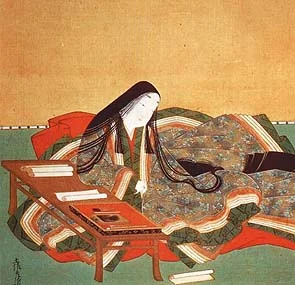Born in 973, Murasaki was a poet and lady-in-waiting at the Imperial court in Kyoto. She is best known as the author of The Tale of Genji, the first novel in the history of literature.
She was the daughter of a minor lord in feudal Japan at a time of relative peace and prosperity. When her mother died, her father raised Murasaki and her younger brother. In preparation for a career in government, her brother was taught the language of government and commerce – Chinese. Because women lived in a gender segregated world and were deemed incapable of learning and scholarship, they were taught a secondary form of written language called kana.
But she was smart and enterprising. In her diary, she wrote “When my brother … was a young boy learning the Chinese classics, I was in the habit of listening to him and I became unusually proficient at understanding those passages that he found too difficult to understand and memorize. Father, a most learned man, was always regretting the fact: ‘Just my luck,’ he would say, ‘What a pity she was not born a man!’”
She married well (a friend of her father) and became part of court life in Kyoto. Women lived restricted and secluded lives at court. To fill the void, they wrote poetry and short stories in kana. Writers would hire calligraphers to copy their works so it could be distributed to friends and family. Murasaki’s short stories were very popular, ultimately leading her to write The Tale of Genji. Written over the course of a decade, the book tells the fictional story of a prince named Genji. Set in modern times, the protagonist is gifted, refined, yet very human. His court escapades and romances help set the narrative for a nuanced view of love and the fragility of life.
Murasaki enjoyed acclaim for the book during her lifetime. After she passed away in 1014, The Tale of Genji and her other writings became required reading among court poets and scholars. By the 13th century, she was venerated as a Japanese classical writer. Japanese painters and illustrators over the decades have used the book for inspiration. Murasaki is often depicted at her desk at the Ishiyama Temple near Kyoto, looking at the moon for inspiration. It is still possible to visit the temple, which is shown below. The book has been translated into multiple languages and remains popular on Amazon.
A few quotes from her work:
“So much for their looks; but their characters - that is a much more difficult matter. We all have our quirks and no one is ever all bad. Then again, it is not possible for everyone to be all things all of the time: attractive, restrained, intelligent, tasteful and trustworthy. We are all different and it is often difficult to know on which aspect to dwell.”
“People make a great deal of the flowers of spring and the leaves of autumn, but for me a night like this, with a clear moon shining on snow, is the best -- and there is not a trace of color in it. I cannot describe the effect it has on me, weird and unearthly somehow. I do not understand people who find a winter evening forbidding.”
“The wood-carver can fashion whatever he will. Yet his products are but toys of the moment, to be glanced at in jest, not fashioned according to any precept or law. When times change, the carver too will change his style and make new trifles to hit the fancy of the passing day. But there is another kind of artist, who sets more soberly about his work, striving to give real beauty to the things which men actually use and to give to them the shape which tradition has ordained. This maker of real things must not for a moment be confused with the maker of idle toys.”
DISCLAIMER: This information is not intended to provide legal or accounting advice, or to address specific situations. Please consult with your legal or tax advisor to supplement and verify what you learn here. This is presented for informational or educational purposes only and does not constitute a recommendation to buy/sell any security investment or other product, nor is this an offer or a solicitation of an offer to buy/sell any security investment or other product. Any opinion or estimate constitutes that of the writer only, and is subject to change without notice. The above may contain information obtained from sources believed to be reliable. No guarantees are made about the accuracy or completeness of information provided. Past performance is no guarantee of future results.


